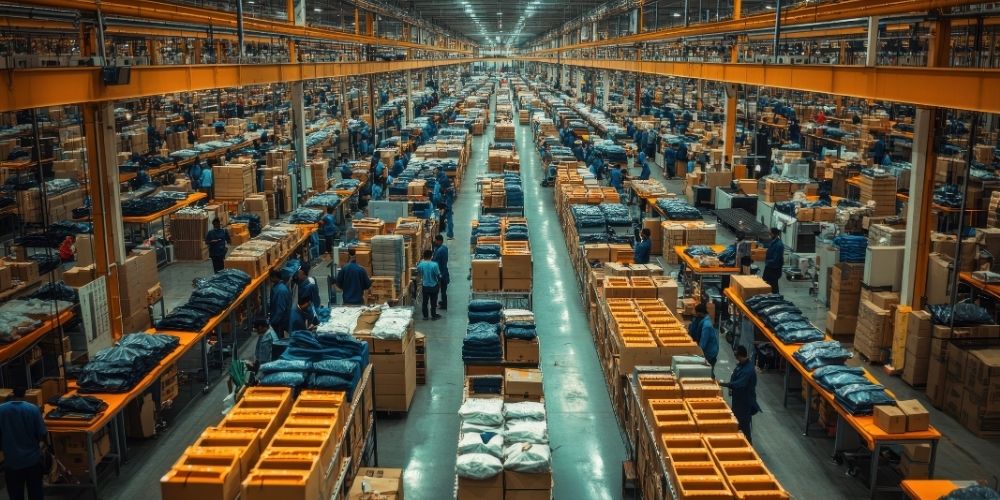India’s Logistics Industry: Key Driver of Economic Development

India’s logistics industry plays a crucial role in the country’s economy, contributing around 14% to the GDP and providing employment for over 22 million individuals. This sector encompasses transportation, warehousing, and value-added services such as packaging, labeling, and inventory management. It also includes prominent third-party logistics (3PL) providers that offer flexible and scalable logistics services to meet the increasing demand. Furthermore, innovative startups are introducing technology-driven solutions to enhance efficiency. Although the sector is quite fragmented, with 1,000 active logistics companies in India, India’s logistics industry is on the path of transformative growth.
The logistics service sector has rebounded strongly post covid, emerging as a key player in India’s ambition to achieve a $7 trillion economy by 2030. Notably, warehousing and transportation are experiencing substantial growth. As reported by IBEF, the Indian warehousing market is expected to hit $34.99 billion by 2027, with a compound annual growth rate (CAGR) of 15.64%. Global investors have a growing interest, resulting in significant investments in the sector and enhancing the presence of logistics service providers.
Key Factors Drivers Growth in the Logistics Industry
The logistics sector is experiencing rapid growth due to several contributing factors:
- The rapid growth of the e-commerce sector has created a pressing need for effective last-mile delivery solutions, leading logistics companies in India to enhance their technology and infrastructure to cater to this rising demand.
- As India establishes itself as a global manufacturing hub, the demand for logistics services supporting domestic production and exports is surging.
- Government initiatives like Bharatmala Pariyojana, dedicated freight corridors, PM GatiShakti, the e-way bill, and the National Logistics Policy 2022 are actively fostering the growth of India’s logistics sector.
- Additionally, the rise of quick-commerce is transforming logistics by boosting the frequency of smaller deliveries. The expansion of direct-to-consumer brands further emphasizes the necessity for efficient delivery solutions, as these brands depend heavily on robust logistics networks.
Urbanisation, the rise of the middle class, and technological advances also contribute to this sector’s growth. At the same time, 3PL logistics providers continue to play a vital role in supporting supply chains.
Job Creation: Logistics expanding employment horizon
India’s Logistics Industry is poised for significant growth, which is expected to create millions of new jobs. By 2027, it is estimated that the industry will generate around 10 million jobs. These opportunities will cover a range of areas, including:
- Delivery and Warehouse Personnel: The surge in e-commerce will drive the need for delivery personnel, pickers, packers, and warehouse staff.
- Logistics Specialists: Positions such as warehouse managers, freight forwarders, and transportation planners are anticipated to see substantial growth.
- Skilled Professionals: There will be a high demand for roles that require expertise in data analytics, AI, and supply chain management.
HR strategies in the logistics industry are being redefined to address both conventional challenges and emerging demands. As hiring for logistics increases, companies are putting more resources into skill development, reskilling and upskilling their logistics workforce in areas such as digital tools and automation to maintain a competitive edge. To combat high turnover rates, particularly in last-mile delivery positions, there is a strong emphasis on employee welfare, mental health support, competitive salaries, and clear pathways for career advancement. Efforts to promote diversity and inclusion are broadening recruitment efforts, while flexible staffing models are being utilized to handle seasonal demand. Additionally, hiring for logistics is becoming more efficient with the use of technology-driven recruitment methods, such as AI, which streamline the hiring process and minimize biases.
Logistics companies in industries such as e-commerce and retail often experience varying workforce needs, particularly during festive seasons, sales promotions, or new product releases. In these scenarios, logistics staffing solutions are essential, offering a budget-friendly way to bring in temporary workers without the obligation of permanent hires. These staffing agencies streamline the hiring process by providing access to pre-screened candidates, addressing specific job requirements, and assisting businesses in managing compliance and administrative tasks. This enables companies to grow effectively while remaining adaptable.
Success Story
A national courier and logistics company in India was facing challenges in managing its growing workforce, including lack of standard processes, no escalation mechanism for queries, and inadequate tech solutions from a previous vendor. TeamLease became their exclusive staffing partner, implemented e-onboarding through the TL Connect App for quick compliance, streamlined payroll with regional collaboration, and provided a TLConnect portal for centralized management of 1300 associates, with potential to scale to 6000+. Chatbot assistance was also introduced for instant query resolution, ensuring 100% adherence to regional compliance.
Future Trends: Technology and Sustainability
Several emerging trends are shaping the future of India’s logistics industry:
- The logistics industry is undergoing a significant transformation thanks to advancements in AI, machine learning, and the Internet of Things (IoT). These technologies facilitate smarter route planning, enable real-time tracking, and enhance warehouse automation.
- To promote eco-friendliness, logistics firms are embracing sustainable practices such as using electric vehicles and environmentally friendly packaging to minimize their impact on the environment.
- There is a notable shift from predominantly road-based transportation, which currently handles 66% of cargo, to a more efficient multimodal transportation approach incorporating railways, waterways, and airways for freight movement.
- Many businesses also lean towards asset-light logistics models, focusing on improving customer experience while outsourcing their warehousing and transportation needs.
The future of logistics in India is focused on adopting technology and sustainable practices. With the help of AI tools, multimodal transport, environmentally friendly methods, and asset-light models, the industry is becoming more efficient, flexible, and eco-conscious. These trends are expected to not only fuel growth but also transform the operations of logistics companies in the coming years.
Overcoming Challenges for a Robust Future
The logistics companies in India is undergoing a significant transformation, fueled by advancements in technology, robust government backing, and evolving logistics staffing solutions. Given its crucial role in the economy and its ability to generate millions of jobs, this sector is set to play a vital part in helping India reach its ambitious economic objectives.
To promote better growth, it is crucial to focus on creating job opportunities, improving learning and development programs, and establishing effective strategies for retaining talent in the logistics industry in India. This strategy will not only tackle existing skill gaps but also guarantee a sustainable and skilled workforce capable of adapting to the changing needs of the sector.
Is your logistics operation ready for peak seasons or unexpected demand surges? Get flexible, skilled contract staffing solutions to meet peak demands and streamline costs. Contact us today!
Latest Blogs
Apprenticeship India: A Guide to NAPS, NATS & Compliance
As India strengthens its workforce strategy, apprenticeship initiatives in India are gaining renewed relevance for employers across sectors. With skill gaps widening and compliance requirements...
Read MoreHow Apprenticeships in India Help Build Job-Ready Talent?
In a fast-evolving job market, businesses across India face a common challenge: finding candidates who are not just qualified on paper but ready to perform...
Read MoreStrategic Workforce Planning in India: Why Smart Talent Strategy is Important?
For years, strategic workforce planning in India was treated as a back-office exercise—something to be revisited when hiring pressure built up or attrition spiked. That...
Read MoreUnion Budget 2026–27 Decoded: What MSMEs and HR Leaders Need to Know
The Union Budget 2026-27, presented on 1 February 2026, signals a deliberate shift toward employment-centric growth, combining sectoral demand creation with long-term investments in skills,...
Read MoreNew Labour Codes: A Compliance Guide for Employers
India’s labour landscape has entered a historic transition with the notification of the four consolidated Labour Codes—the Code on Wages (2019), Industrial Relations Code (2020),...
Read More





